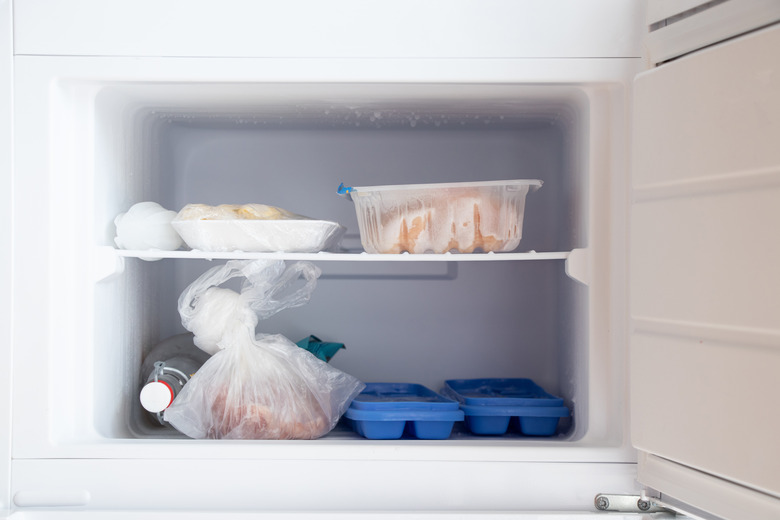This Popular Kitchen Tool Is Actually A Breeding Ground For Bacteria
When was the last time you washed your ice cube trays? Like, really washed them. And no, quickly rinsing them under running water doesn't count. We're talking about thoroughly cleaning them, soapy water and all.
If you're not regularly washing your ice cube trays, you might want to change that, stat. As it turns out, the kitchen item is the ultimate breeding ground for yucky bacteria — even if you only use them with water.
In fact, compared to other kitchen tools, "ice cube trays may be more likely to pose food safety risks as many people don't clean them as often as other kitchen items," explains Lisa Yakas, microbiologist and senior account manager of product certification at NSF, a public health and safety organization previously known as the National Sanitation Foundation. However, ice cube trays can become cross-contaminated with bacteria (as well as yeast and mold) just like other kitchen tools, says Kimberly Baker, Ph.D., R.D., L.D., director of the food systems and safety program team at Clemson University Extension Service.
"Most commonly, ice cube trays [can] become contaminated when handled by someone who does not have clean hands," Baker tells Hunker. She adds that contamination can also happen if the tray is placed on an unclean surface, like a countertop, or when other liquids or foods come in contact with the tray, both in and out of the freezer.
Needless to say, there are many opportunities for ice cube trays to pick up germs, especially if they're not washed often enough. For ice and ice cube trays specifically, this may include bacteria like E.coli, Staphylococcus, Pseudomonas, and Bacillus, says Baker.
But wait ... won't the cold temps in a freezer work against germs? Not necessarily. According to Baker, freezing temperatures can temporarily stop pathogens from reproducing — but it won't kill them. So if your ice cube tray contains bacteria, anything that's frozen in said tray — like fruit or broth — will bacteria on it, too. Gross.
This is especially true if you fill an ice cube tray and leave it out for a while. That's because the water may reach the temperature danger zone, i.e., 40 to 140 degrees Fahrenheit. This is the range in which bacteria grows most quickly, according to the United States Department of Agriculture. Additionally, "the longer the tray is in the temperature danger zone, the more pathogens [will] likely reproduce," says Baker.
The actual contents of an ice cube tray matter, too. "Freezing perishable items such as fruit, broth, and juices can increase [the] risk of breeding bacteria, especially if you don't put your ice cube trays in the freezer right away," Yakas tells Hunker. That's because such foods — especially fruits and fresh fruit juices — are more likely to already contain bacteria.
How to Clean Ice Cube Trays
How to Clean Ice Cube Trays
All that said, it's important to regularly clean your ice cube trays. As Yakas explains: "You should treat your tray just like any other item in your kitchen by washing it after every use, especially if you're using your ice cube tray for non-water items such as herbs, juices, coffee, or other liquids." Also, if you routinely freeze non-water foods or liquids, you may want to have separate trays for freezing water ice cubes to minimize cross-contamination.
Before cleaning an ice cube tray, check the manufacturer's instructions. You might be able to toss it in the dishwasher and call it a day. Otherwise, to clean an ice cube tray by hand, wash it with hot soapy water and let it air dry before refilling, says Baker. And if your tray is plagued by smells or hard water buildup? Soak the ice cube tray in a 1:1 vinegar-water solution for 15 minutes, then rinse well and air dry, suggests Yakas.
While you're at it, avoid storing raw meats, seafood, or dairy items near your ice cube trays, Yakas recommends. This could cause bacteria-ridden juices or other liquids to accidentally leak into the trays, ultimately contaminating the cubes.
